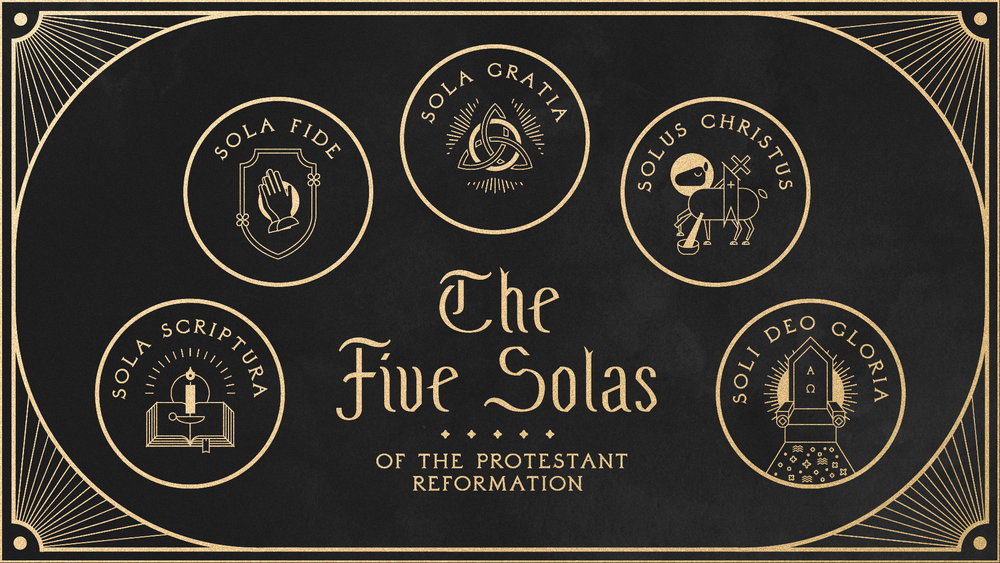Your Legal Resource
The Five Solas
What are the Five Solas?
The Five Solas are five Latin phrases that represent the core positions held by those who adhere to the Protestant Reformation that happened in the 16th century. They are more commonly recognized within the Reformed (Calvinist) perspective. The Five Solas are Sola Scriptura, Solus Christus, Sola Gratia, Sola Fide, and Soli Deo Gloria.
1. Sola Scriptura � Scripture alone
This does not mean that tradition or councils are not considered. It means that the Scriptures alone are the final and the highest authority. Everything that the Scriptures address is to be used as the final word on that topic. All things that we learn from other sources must be compared to Scripture, and if they do not match Scripture or if they contradict Scripture, then we are not to affirm them. The Bible says not to exceed what is written (1 Corinthians 4:6).
2. Solus Christus � Christ alone
This position means that Christ Jesus is the only means of salvation (John 14:6), the only mediator (1 Timothy 2:5) and that Jesus is the only human revelation of God. In other words, God has revealed Himself in the person of Jesus, and no other person who has ever lived is God in the flesh (John 1:1, 14).
3. Sola Gratia � Grace alone
This means that we are saved from our sins and damnation by the unmerited grace of God alone without any of our works. Grace is the completely unmerited, undeserved favor of God that he bestows upon us. The grace of God is completely motivated out of his own character and is his kind intention and merciful action upon various individuals. Thus, we are saved from his righteous judgment by his unmerited and unearned favor, and there is nothing that we can do or have done that can move God to be gracious to us.
4. Sola Fide � Faith alone
This means that we are saved from our sins by faith alone in Christ, and not by faith and anything we do, whether it be baptism, church membership, good works, sincerity, or anything else. God is the proper object of faith. When we have faith in the work of Christ and his sacrifice on the cross, we are justified (Romans 5:1).
5. Soli Deo Gloria � the Glory of God alone
This means that God alone is the one who is to receive all the glory. He alone is the author and finisher of our salvation and works all good things through our lives. He has revealed Himself in the person of Jesus, and in great humility and love, died on the cross bearing our sins (1 Peter 2:24) so that we might enjoy his presence forever. We are to live for Him and glorify Him (Isaiah 43:7).
These five solas were developed during the Protestant Reformation in response to the heresies found in the Roman Catholic Church. Thus, to fully understand the context of the five Solas, it is important to understand what the Roman Catholic Church teaches on these subjects:
1. Scripture: Roman Catholicism denied the sufficiency of Scripture and sought to consider sacred tradition as of equal value.
- ��the Church, to whom the transmission and interpretation of Revelation are entrusted, does not derive her certainty about all revealed truths from the holy Scriptures alone. Both Scripture and Tradition must be accepted and honored with equal sentiments of devotion and reverence� (Catechism of the Catholic Church, par. 82).
2. Christ: Though it did affirm that Christ was the only means of true salvation, it adds the intercession of the Saints and Mary as an additional means of accessing God.
- �If anyone saith, that it is an imposture to celebrate masses in honor of the saints, and for obtaining their intercession with God, as the Church intends; let him be anathema� (Council of Trent, Canons on Justification, Canon 5).
3. Grace: Furthermore the Roman Catholic Church denied that a person�s sins are forgiven by the unmerited grace of God alone. Catholicism teaches that salvation is merited by obedience to the commandments.
- ��Moved by the Holy Spirit and by charity, we can then merit for ourselves and for others the graces needed for our sanctification, for the increase of grace and charity, and for the attainment of eternal life� (CCC 2010).
- �Moved by the Holy Spirit, we can merit for ourselves and for others all the graces needed to attain eternal life, as well as necessary temporal goods� (CCC 2027).
4. Faith: In addition, Roman Catholicism condemns the idea of faith alone and says that salvation is dependent on faith and participation in the sacraments, among other things.
- �If anyone saith, that by faith alone the impious is justified; in such wise as to mean, that nothing else is required to cooperate in order to the obtaining the grace of Justification and that it is not in any way necessary, that he be prepared and disposed of by the movement of his own will; let him be anathema� (Council of Trent, Canons on Justification, Canon 9).
5. Glory: The Roman Catholics largely say they seek the glory of God. it is unfortunate that too much of the glory and adoration given is focused on the Pope and Mary.
- �By asking Mary to pray for us, we acknowledge ourselves to be poor sinners and we address ourselves to the �Mother of Mercy,� the All-Holy One� (CCC 2677).
- �After speaking of the Church, her origin, mission, and destiny, we can find no better way to conclude than by looking to Mary� (CCC 972).
- ��so no man goeth to Christ but by His Mother� (Vatican Website: Encyclical of Pope Leo 13th on the Rosary, October Mense, Pope Leo 13th, 1903-1914).
In light of the Roman Catholic errors, the reformers developed the five solas as a set of declarations that stood in opposition to the Roman Catholic heresies.
